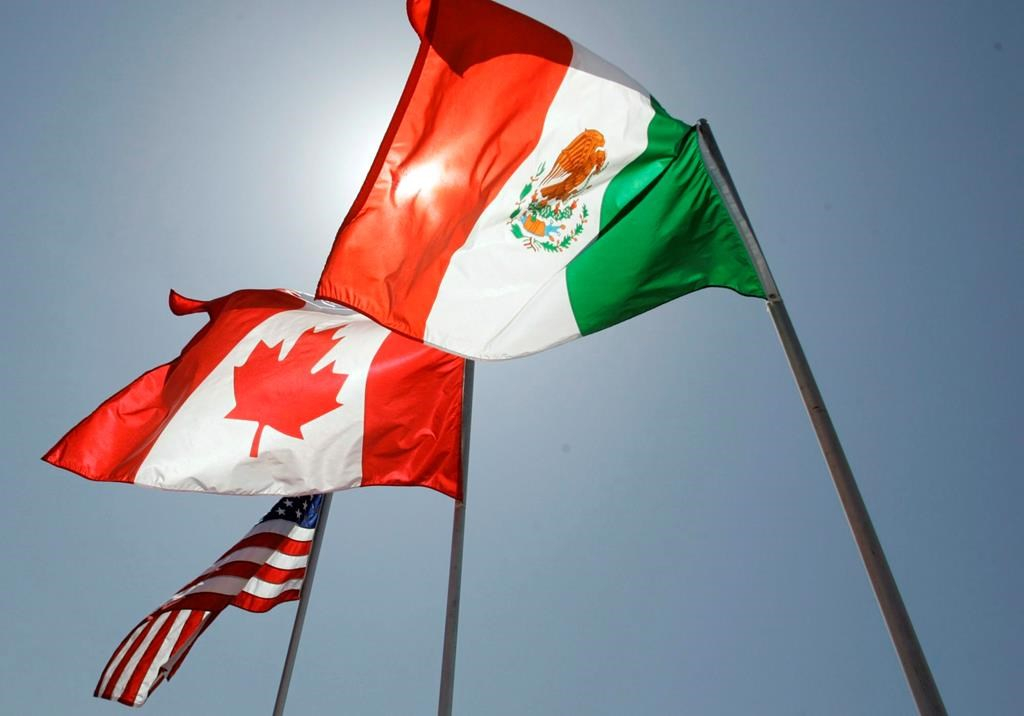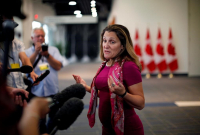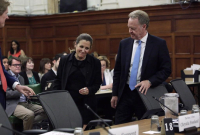The hurry-up-and-wait uncertainty surrounding Canada's return to the NAFTA talks is entering a new week as Ottawa's partners in the trilateral deal push forward with their one-on-one negotiations.
For five weeks, top officials from both the United States and Mexico have logged many hours of face-to-face talks in Washington on the North American Free Trade Agreement. With signs of progress apparent, the high-level American-Mexican meetings stretched through the weekend.
But even with brightening prospects, Ottawa has remained absent from summertime discussions on a continental pact that's deeply important for the Canadian economy. A timeline for Canada's return to the table has yet to be mapped out.
The federal government insists it hasn't been frozen out of the talks, and Foreign Affairs Minister Chrystia Freeland said she's been in regular contact with both her counterparts, U.S. Trade Representative Robert Lighthizer and Mexican Economy Minister Ildefonso Guajardo.
Canadian officials have argued the bilateral period has been necessary for the U.S. and Mexico to sort out tough issues such as rules of origin for autos.
But trade experts say Canada's omission is — at least in part — a tactic by the White House to divide and conquer as it applies extra pressure on Ottawa to accept what could be a less-palatable deal.
Peter Clark, a veteran Ottawa-based trade strategist, said the U.S. is letting Canada cool its heels in what he calls a unique approach to negotiations.
"It's not unusual to have bilateral sessions, but not to this extent," said Clark, who considers a Lighthizer a good tactician.
"It's an Ambassador Bob special."
Derek Burney, a former Canadian ambassador to Washington, agrees that keeping Canada away from the table in recent weeks is part of the U.S. strategy.
"Crude and rude to be sure. But not necessarily damaging," Burney wrote in a brief email, adding that Canadian officials "will have to wait and see, while holding our ground without flinching."
Ohio-based trade lawyer Dan Ujczo said the bilateral U.S.-Mexico talks are necessary because the two countries' one-on-one issues are more significant at this point in the year-long negotiations — but he added that leaving Canada on the sidelines has an added effect.
"I think it was just a negotiating reality, but there's no question in my mind that it was designed to impose maximum leverage — as any negotiator would," said Ujczo, who works for the law firm Dickinson Wright.
For several weeks, Canada's team has been expected to rejoin the talks in Washington, but its anticipated return has been delayed and it remains unclear when it will be invited back.
Even when Canada is asked to rejoin, its negotiating team might have to begin without Freeland. She's on a diplomatic visit to Europe until Thursday, with stops in Germany, Ukraine and France.
Clark said there are expectations Freeland will return to Washington on Friday. From there, he thinks Lighthizer might hold separate bilateral talks with both Canada and Mexico before restarting trilateral discussions that have been on hold since the spring.
"It's not a negotiating style. He's just trying to get everything he can out of each side and he prefers to do that one on one," Clark said.
There are also concerns Canada's two NAFTA partners have gone much deeper into trilateral issues during Ottawa's absence.
Over the weekend, Reuters reported that Jesus Seade, the chief negotiator for Mexico's incoming government, said the U.S. had softened its demands for the inclusion of a so-called "sunset clause" within NAFTA. Canada has flatly rejected the addition of a sunset clause, which would see NAFTA renegotiated every five years.
On Sunday, a Canadian government official, speaking on condition of anonymity because of the sensitive nature of the talks, said any U.S.-Mexico agreements on matters that concern all three countries would still require Canada's signature.
Prime Minister Justin Trudeau said last week that his government "will only sign a good deal for Canadians."
Meanwhile, U.S. President Donald Trump has made efforts to amplify the pressure on Ottawa.
He suggested earlier this month that his administration had deliberately iced Canada out of the NAFTA talks. On Saturday, he said the U.S. "relationship with Mexico is getting closer by the hour" in a tweet that made no mention of Canada.
"A big Trade Agreement with Mexico could be happening soon!" Trump tweeted.
Some say the White House is also feeling some heat to strike a deal.
Ujczo said because of political and procedural hurdles on the horizon in the U.S. and Mexico, the coming week will be crucial for NAFTA's renegotiation. He believes the White House will want to lock down a deal soon to ensure it's completed before the incoming Mexican government takes office on Dec. 1.
"There is a very short window to close this deal and claim victory, and it's an important political priority for the president," he said.
"The negotiator-in-chief needs to show he can close a trade deal."





Comments